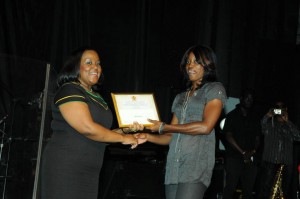BETTER DETAILS
Police on Sunday were hunting for a 42-year-old man who is accused of fatally shooting his ex-girlfriend and a celebrated reggae artist as the two were checking out of a Bronx motel along the New England Thruway.
Joseph Kernizan was allegedly waiting in the parking lot of the Holiday Motel shortly after 3 a.m. Saturday morning as Tracy Bennett and Wayne Hamilton were getting into a car, a law-enforcement official said.
Ms. Bennett, 38, and the suspect have two children and had been living together on Long Island, a law-enforcement official said. She had taken out an order of protection against Mr. Kernizan in August.
According to surveillance video recovered at the scene, Ms. Bennett and Mr. Hamilton were getting into her white sedan when the suspect blocked it with his car, the official said. Mr. Kernizan then allegedly got out of the car with a gun and fired two shots at the white sedan, the official said.
As Mr. Hamilton, 50, was trying to escape, the camera shows Mr. Kernizan allegedly chasing him down a small walkway firing several shots in his direction, striking him in the torso, the official said.
The camera then shows Mr. Kernizan returning to the parking lot and allegedly shooting Ms. Bennett once in the face, the official said. After she fell to the ground, he allegedly stood over her and continued shooting, striking her several times in the head, face, back and chest.
Mr. Kernizan then returned to Mr. Hamilton, who can be seen crawling away, and fired at him several more times, striking him in the head, before fleeing, the official said. He was last seen driving southbound on the thruway.
Police on Sunday described Mr. Kernizan as 5-foot-5 and 220 pounds. He has an extensive criminal record including robbery, assault and criminal firearms possession.
Mr. Hamilton, whose stage name is “Captain Barkey,” had been part of the Jamaican reggae scene since the late 1980s, said Ralston Barrett, who served as his manager from 1999 to 2002.
Mr. Hamilton, who lives in Milwaukee, had played a show in the city earlier that night.
He got his break in the late 1990s with the recording of “Go Go Wine,” which would go on to be a chart hit.
He followed with a handful of other hits including “Bun Fi Bun,” making him a mainstay on the circuit into the early part of the century.
“He was an all-in-all good guy, a very humorous guy,” Mr. Barrett said. “His music was kind of different. He did more light-hearted topics.”
“It’s unbelievable. I still can’t believe it,” Mr. Barrett said.
http://www.hmipix.com/police-explains-how-the-suspect-joseph-kernizan-aka-country-killed-the-victims-from-the-surveillance-camera-gruesome/
WHAT DOES THE BIBLE SAY ABOUT DIVORCE- GOODMORNING
What does the Bible Say About Divorce?
The institution of marriage between a man and a woman goes back to the beginning of Creation and has been recognized by every culture as the foundation of both family and civilization itself. God created two sexes, “male and female” (Gen. 1:27, 5:2), and He did so for the mutual benefit of both genders. The man and the woman bring different strengths into the relationship, and by doing so strengthen both the relationship and the family. When the two sexes come together, God says they become one flesh (Gen. 2:24; Matt. 19:5; Eph. 5:31; 1 Cor. 6:16). The book of Malachi points out that another reason God made the man and woman one flesh in the covenant of marriage was so that the children would be godly: “Has not the LORD made them [husband and wife] one? In flesh and spirit they are his. And why one? Because he was seeking godly offspring” (Mal. 2:14 and 15).
Sadly, it sometimes happens in a marriage that the differences between a man and woman, instead of being appreciated and capitalized upon by the couple, are the cause of friction, division and even divorce. Marriage goes back to Genesis, but so do reasons for divorce. God understands that sometimes the relationship between a man and a woman becomes so hurtful that divorce is the only practical solution, and so He allowed for it in the Mosaic Law (Exod. 21:11; Deut. 24:1). Jesus Christ correctly stated that the foundational reason for divorce was people’s hardness of heart, but pointed out that God did not design marriage to end in divorce. Jesus said, “…Moses permitted you to divorce your wives because your hearts were hard. But it was not this way from the beginning” (Matt. 19:8).
Christians have discussed and debated the subject of divorce for hundreds of years, and different groups have different beliefs about it. One of the more hurtful doctrines held by some groups is that God never allows divorce. These groups do not allow the same freedom that God allowed in the Law of Moses, and Jesus allowed for in his teachings; that there are times when divorce may be necessary for the health and safety of one of the partners or the children. Another false doctrine about divorce is that God allows for divorce only if one of the spouses has committed adultery. That belief comes from reading the words of Jesus without understanding the culture of his time or the entire scope of the Word of God, i.e., what else the Bible says about the subject.
To understand what Jesus said about divorce, we must read what he said in light of the context, the culture, and the Mosaic Law. We must never think that the Bible is like one of those books of unconnected wise sayings that some people have on their coffee tables. No verse stands on its own, but is interconnected with every other verse and with the general theme of the Bible. That means to really understand what the truth is on any subject we have to pay attention to how all the verses on the subject relate to each other, and that means we have to study the entire Bible. Jesus’ statements about divorce are recorded in Matthew 5:31 and 32, 19:3-9; Mark 10:2-12; and Luke 16:18, but there is also material in the Old Testament and other places in the New Testament that must be considered. As for the culture in Jesus’ time, the rabbinic school of the great Jewish teacher, Rabbi Hillel (ca. 60 B.C. – 20 A.D.), was teaching that a man could divorce his wife for anything she did that displeased him. It was a “no fault” system of divorce, and divorce was becoming a major social problem. We get a glimpse of the cultural problem of easy divorce in Jesus’ time by the question the Pharisees asked Jesus: “…Is it lawful for a man to divorce his wife for any and every reason?” (Matt. 19:3). Jesus answered them in a way that promoted marriage and the family (Matt. 19:4-9).
It is important to notice that Jesus is never recorded giving a complete teaching on marriage and divorce. Instead, he addressed the question he was asked and the cultural problem of his time, and tried to get people to look at the posture of their hearts and see the purpose of marriage from God’s perspective. Jesus never meant his teaching about marriage and divorce to be pulled from its cultural context and separated from the Law of Moses, which completed it. If Jesus had given a complete teaching on divorce, then he would have mentioned the rights granted to women under the Mosaic Law. Jesus did not mention women in his answer because he did not need to in order to emphasize God’s heart for marriage and relationship, or to reply to the question he had been asked. Jesus did not come to abolish the Mosaic Law, but to fulfill it (Matt. 5:17).
To understand God’s heart about marriage, we need Scripture and logic. It is clear from the Bible and history that the intent of marriage is to benefit both partners and to raise godly children. Nevertheless, there are times when the marriage becomes harmful to one or both of the partners, or the children. At that point the marriage may need to be dissolved, and in certain circumstances God allowed for the dissolution of the marriage. The book of Exodus contains important information about divorce. To fully understand the verses, however, we must be aware that the Law of Moses allowed for a man to have more than one wife (Exod. 21:10; Lev. 18:18; Deut. 21:15).
Exodus 21:10 and 11
(10) If he marries another woman, he must not deprive the first one of her food, clothing and marital rights.
(11) If he does not provide her with these three things, she is to go free, without any payment of money.
What we see clearly revealed in Exodus 21 is that when a man and a woman enter into a marriage covenant, each is responsible to provide for the other. What the woman would provide in the marriage is not specifically spelled out in Exodus because it was so well understood in the culture and because the woman did not usually have the power to divorce a man unless that privilege was specifically granted to her by local or current law or custom. In contrast to the assumed responsibilities of the woman, Exodus 21:11 specifically states that a man must provide food, clothing, and “marital rights,” or the woman is free to leave the relationship.
We must understand the three things listed in Exodus 21:11 in light of the Old Testament culture, not our modern culture. The “food” was the woman’s daily food that sustained her. Her “clothing” meant clothing, and also by extension, a place to stay, her shelter. Some poor people did not have enough money to own a house or tent, and slept under their heavy outer robes at night (Exod. 22:27), so “clothing” often meant both clothing and shelter. A man was responsible, as much as he was able, to provide clothing and shelter for his wife.
The third thing in the list, “marital rights,” refers to sexual intercourse. Although this hopefully included loving affection, in the context of the Old Testament culture, the most important thing it meant was that the woman would have the chance to have children. In an age when bank accounts, Social Security, hospitals, and retirement homes were non-existent, it was a woman’s children who provided her protection and care throughout her life and especially in her old age. A man who would not have sexual intercourse with his wife because he had another wife or wives thus subjected her to the danger of getting sick, hurt, or becoming elderly without any means of help and support. This was very cruel indeed, and God would not tolerate it. If a man treated his wife this poorly, the Law said she was free to leave.
Exodus 21:11 is crucial to our understanding of marriage and divorce. To really appreciate what it says, we need to know that the Law of Moses contains God’s heart for healthy, blessed, and godly families and society. However, someone may say, “But we are not under the Law today.” That is only partly true. The New Testament contains the phrase that we are not under the Law, but that phrase must be read and understood in its proper context (Rom. 6:14 and 15; Gal. 5:18). The “Law” has many parts. There are moral regulations, social regulations, civil regulations, and regulations that are tied to the Temple and priestly system.
Jesus freed us from the curse of the Law, the Levitical codes, and the sacrificial regulations, but he did not free us from all of the civil and social regulations, which is why so much of it is repeated in the New Testament. After all, the commandments to not steal, not commit adultery, not covet, not build unsafe buildings, to give to the poor, to punish evildoers, etc., are still in force. Furthermore, the Law embodies God’s wisdom for families and society, which is why Paul wrote that “…the law is holy, and the commandment is holy, righteous and good” (Rom. 7:12). The Law is holy and good, and we today are not free from God’s wisdom, or His desire that our families be a safe haven for each member.
God spoke again about divorce in Deuteronomy, but He never gave a specific reason a man could divorce his wife.
Deuteronomy 24:1
If a man marries a woman who becomes displeasing to him because he finds something indecent about her, and he writes her a certificate of divorce, gives it to her and sends her from his house,
God never tells us what the “something” was about the woman that was “indecent.” To be sure, if God wanted to give us reasons for divorce He could have done so. He could have given us a detailed list, but He did not. What does that mean? To Rabbi Hillel, and the people in Jesus’ time who followed his teaching, it meant that a man could divorce his wife for any reason, no matter how small. To Jesus, it meant just the opposite: God gave no reason for divorce because the foundational reason for it was the hardness of people’s hearts. Is adultery a “reason” for divorce? No. Many couples have weathered rough periods and even adultery, but stuck it out, worked through their problems, and now are happily married. Divorce boils down to an issue of the heart, not a specific “reason” that forces the couple to divorce. Of course, some people’s hearts are hard, even to the point they endanger a spouse or child. The loving heart of our Father God does not force people to stay in dangerous or abusive relationships. If someone’s heart is that hard, the partner is free to leave.
By the time of Christ, people had forgotten God’s heart about marriage, and men were divorcing their wives for all kinds of things, frequently just to be with other women. Even King Herod had married his brother’s wife (Mark 6:17). The religious leaders came to Jesus to ask him about the Law, and pointed out that Moses allowed for divorce. Yes, Moses (actually, God) allowed for divorce, but to these hard-hearted religious leaders, God’s regulations were mostly a matter of the academic study of what was permissible. They were not trying to rebuild God’s care for the family back into their society. In contrast, Jesus desperately wanted families and society to be whole again. He did not want to contribute to the “I am right and you are wrong about the interpretation of the Law” attitude that was so prevalent in his society, so he answered the leaders in a way that spoke so highly of the unity in marriage that even his disciples were astounded, and said, “…If this is the situation between a husband and wife, it is better not to marry” (Matt. 19:10).
Jesus spoke to the religious leaders about God’s heart for marriage.
Matthew 19:4-6
(4) “Haven’t you read,” he replied, “that at the beginning the Creator ‘made them male and female,’
(5) and said, ‘For this reason a man will leave his father and mother and be united to his wife, and the two will become one flesh’?
(6) So they are no longer two, but one. Therefore what God has joined together, let man not separate.”
Furthermore, Jesus told them that if a man divorced his wife for reasons other than sexual immorality, he was an adulterer. He even made that statement in the Sermon on the Mount (Matt. 5:31 and 32). Jesus was not trying to set up a new universal standard for divorce regardless of sex, which would annul the Law of Moses, ignoring how the marriage regulations in the Law of Moses protected women from men who refused to provide for them or treated them cruelly. Jesus was speaking to men in the context of his “easy divorce” culture, and was pointing out how important marriage was to God. It was not valid in the eyes of God to dissolve a marriage for all the selfish, “no fault” excuses that people were using in his day and time. Jesus could have also quoted the book of Malachi: “‘I hate divorce,’ says the LORD God of Israel…” (Mal. 2:16).
Sadly, many people now read Jesus’ words and assert that the one and only reason for divorce is if one of the spouses commits adultery. There is a possibility that Jesus’ words have not been translated correctly, but that is too much to delve into in this short article. What is perfectly clear, however, is that we must always compile information from the whole Word to get the truth on a subject. No verse, even spoken by Jesus, stands on its own. We can see this by comparing what Jesus said about divorce in the different Gospels.
For example, in the gospel of Mark, Jesus said that if a person divorced and then remarried he committed adultery: “…Anyone who divorces his wife and marries another woman commits adultery against her. And if she divorces her husband and marries another man, she commits adultery” (Mark 10:11 and 12). Here in Mark, Jesus says divorce and remarriage is committing adultery, but in other Gospels he says remarriage is not adultery in the case of divorce due to sexual immorality. Thus we see that even what Jesus said in different Gospels needs to be compared to get the complete truth about what he taught. In the same way, the teachings of Jesus need to be compared with verses throughout the whole Bible to get the truth on any subject. After all, does it make sense that Jesus would say a woman had to stay with a man who was abusing and endangering her, even though God’s Law in Exodus said she could leave him? No, Jesus would not be that unloving, nor would he go so completely against the expressed wisdom of God.
The entire Bible has to fit together on any subject, and that is certainly the case with divorce. In that light, the Apostle Paul did not contradict either the Mosaic Law or Jesus. He stated the heart of God clearly and concisely.
1 Corinthians 7:10 and 11b
(10) To the married I give this command (not I, but the Lord): A wife must not separate from her husband.
(11b) …And a husband must not divorce his wife.
These verses clearly state the will of God. Divorce is hurtful; it is destructive. Furthermore, many “intolerable” situations can be tolerated and relationships can be restored if each partner is willing to let go of their hurt and pride, draw strength and hope from the Lord, and get help in getting back together. Unfortunately, some well meaning people take these words of Paul to be the unbending will of God, and say that Christians must never divorce for any reason. However, as with every other verse of Scripture, we must interpret them in light of the context and then the whole Word of God. Immediately after saying a wife must not separate from her husband, the Bible says, “But if she does….” Thus, just like in the Law of Moses, the will of God that couples stay together is clearly stated, but allowance is made for cases in which they do not.
After writing that a woman must not divorce her husband, Paul writes that if a woman does leave her husband, she should remain unmarried or be rejoined to her ex-husband (1 Cor. 7:11). Again, this is what God would ideally want to happen. However, once again allowances are made for people who do not obey this command. The very same chapter that says to not divorce, or remain unmarried if you do divorce, says, “Are you bound to a wife? Do not seek to be free. Are you free from a wife? Do not seek a wife. But if you do marry, you have not sinned….” (1 Cor. 7:27 and 28 – ESV). [1]
Does it seem confusing that God says, “Do not divorce,” but then says if you do get a divorce do not remarry; but then says, if you do remarry “you have not sinned”? The Bible may seem confusing, but it is because life is confusing and relationships are confusing. Thankfully, we have a loving God who is willing to love us and work with us in whatever situation we find ourselves. He does not hold us to a single, sometimes unreachable standard, but like any loving parent, loves His children and helps them no matter what their situation. He clearly sets forth His ideal and what would be best for us, and then He gradually makes allowances for our faults and failures so that we can move forward in life, making the best of the situations in which we find ourselves.
For our part as His children, we should not take advantage of God’s love and grace, but diligently strive to obey God’s highest standards. “The easy way out” is almost never God’s way. Divorce may seem easy, and people may think that if they just end a difficult marriage then life will be much better, but many times things do not work out that way. Although to someone in a troubled marriage it may seem that anyone would be better than the current spouse, statistics show that the divorce rate for second marriages is even higher than the divorce rate in first marriages. This is conclusive evidence that our first spouse may not be as big a problem as we thought. The old cartoon character, Pogo, may well be correct: “We have met the enemy, and he is us.”
In conclusion, does God want couples to divorce? No, He does not. As we saw in Malachi, He said He hates divorce. But does God allow for divorce due to hardheartedness, or to protect a spouse or child? Yes, He does. Nevertheless, a lot of divorces could be prevented if couples were more willing to put time and energy into having successful marriages.
Marriages have been under attack ever since the Serpent attacked Adam and Eve in the Garden of Eden and their fall from Paradise put immense pressure on couples and the marriage covenant. In contrast to angels, which do not marry or reproduce (Matt. 22:30), humans enter into a marriage covenant and reproduce, and it takes the best effort of both the husband and wife to build the marriage relationship and raise godly children. Satan knows that by destroying the marriage, he greatly affects both the parents and the children, so he wages a relentless war against marriage.
As warriors in the spiritual battle, Christians are to fight to protect and preserve their marriages. Husbands and wives are different because God designed them to be. Sadly, most couples have never learned how to use their differences to their advantage and complement one another. Instead, they compete against each other, are not honest with each other but hide things from one another, refuse to forgive, and in general live in a manner that is not truly self-sacrificial. Mutual submission to one another motivated by reverence for Jesus Christ is a prerequisite for a successful Christian marriage (Eph. 5:21), and when there is humility, honor, and love in the marriage, besides having a wonderful relationship that is a joy, the couple will offer up powerful prayers to God (1 Pet. 3:1-7).
Good marriages do not “just happen.” The spiritual battle is far too intense, and temptations and weaknesses of the flesh are far too common, for good marriages to happen without work. The chemistry we felt when we first fell in love may have seemed like it “just happened,” but no marriage can be successfully maintained without hard work. We need to learn about our gender differences, build our communication skills, practice patience and selflessness, work at our teamwork, magnify each other’s good points, and forgive each other’s faults and failures. If we do that, we will find that we will not need to take advantage of God’s allowance for divorce. Let’s raise our vision of Christian marriage so it is in alignment with the glory God intended it to display!
****RULES**** 1. Debates and rebuttals are allowed but disrespectful curse-outs will prompt immediate BAN 2. Children are never to be discussed in a negative way 3. Personal information eg. workplace, status, home address are never to be posted in comments. 4. All are welcome but please exercise discretion when posting your comments , do not say anything about someone you wouldnt like to be said about you. 5. Do not deliberately LIE on someone here or send in any information based on your own personal vendetta. 6. If your picture was taken from a prio site eg. fimiyaad etc and posted on JMG, you cannot request its removal. 7. If you dont like this forum, please do not whine and wear us out, do yourself the favor of closing the screen- Thanks! . To send in a story send your email to :- [email protected]































Recent Comments